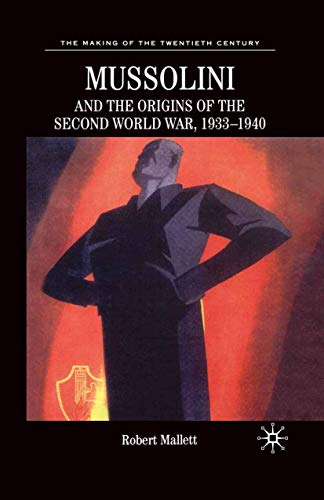
Mussolini and the Origins of the Second World War, 1933-1940
by M. Feldman
Popularity
2.06 / 5
* A book's popularity is determined by how it compares to all other books on this website.
Where to buy?
Buy from Amazon* If you buy this book through the link above, we may receive a small commission at no extra cost to you.
Mussolini and the Origins of the Second World War, 1933-1940 by M. Feldman
Details
War:
World War II
Biography:
No
Region:
Europe
Page Count:
266
Published Date:
2003
ISBN13:
9780333748152
Description
Main Themes and Topics
M. Feldman's Mussolini and the Origins of the Second World War, 1933-1940 delves into the complexities of Mussolini's foreign policy during a tumultuous period in global history. The book attempts to resolve the ongoing debate about Mussolini's true international intentions, questioning whether he was pro-British or if his ambitions were more nefarious, driven by dreams of creating a Fascist empire. Feldman explores the potential imperial designs of Mussolini in the Mediterranean and Red Sea, suggesting that these ambitions were influenced by the evolving political landscape, particularly with the rise of Hitler in 1933. The author provides a reassessment of significant historical events such as the Ethiopian Crisis, the Spanish Civil War, and various diplomatic tensions leading up to World War II. By analyzing Mussolini's policies, Feldman offers a broader perspective on the factors contributing to the eruption of global conflict in 1939, highlighting Mussolini's active role.
Writing Style and Tone
Feldman's approach is scholarly yet accessible, making use of extensive archival evidence to support his arguments. The writing maintains an academic rigor, offering a well-researched narrative that is both informative and engaging. The tone is objective, aimed at presenting a balanced view of historical events and Mussolini's involvement in them. Feldman's incorporation of previously unpublished materials adds a fresh dimension to the narrative, ensuring that the book appeals to both historians and general readers interested in World War II and European history.
Criticism
While many readers appreciate the depth of research and new insights provided by Feldman, some critics argue that the book could benefit from a more comprehensive exploration of counterarguments to Mussolini's motivations. Additionally, a few readers find the dense historical detail overwhelming, which might not cater to those looking for a lighter historical read. Nonetheless, Feldman's meticulous examination of archival evidence generally receives positive feedback for its contribution to understanding the interwar period and Mussolini's role in it.
Brief Summary
Mussolini and the Origins of the Second World War, 1933-1940 by M. Feldman investigates the intricacies of Benito Mussolini's foreign policy during the late interwar years. The book challenges previous narratives by analyzing archival evidence that sheds new light on Mussolini's ambitions and his complex relationship with Nazi Germany. Feldman provides a critical reassessment of key historical events, offering insight into Mussolini's impact on the geopolitical landscape that paved the way to the Second World War. This work serves as a significant contribution to the historiography of the interwar period, presenting a nuanced view of Mussolini's political maneuvers and their global implications.









